An Overview of Petroleum Contracts and Economics in Ghana
VerifiedAdded on 2020/06/05
|7
|1276
|49
Report
AI Summary
This report focuses on the fiscal system regime of petroleum in Ghana, a country that has been a significant oil producer since 2010. It examines the impact of declining government budgets and economic growth on the oil industry, including the government's reliance on IMF support. The report delves into the fiscal system structure, covering tax and royalty contracts, product sharing contracts (PSCs), and service contracts, with a primary focus on PSCs. It explores the legal framework, key principles of PSCs, weaknesses, and proposed revisions in the context of Ghana. The analysis includes legislative, tax, and contractual issues, as well as the roles of the Constitution of Ghana, petroleum law, and the National Petroleum Corporation Ghana (GNPC). The report highlights the advantages and disadvantages of PSCs, discussing aspects such as risk allocation, government profit sharing, and the need for transparency. It concludes with proposed revisions to enhance the effectiveness and transparency of petroleum contracts in Ghana, including a uniform policy covering new fiscal terms, various hydrocarbons, and international competitive bidding. The report references several books and journal articles to support its findings.
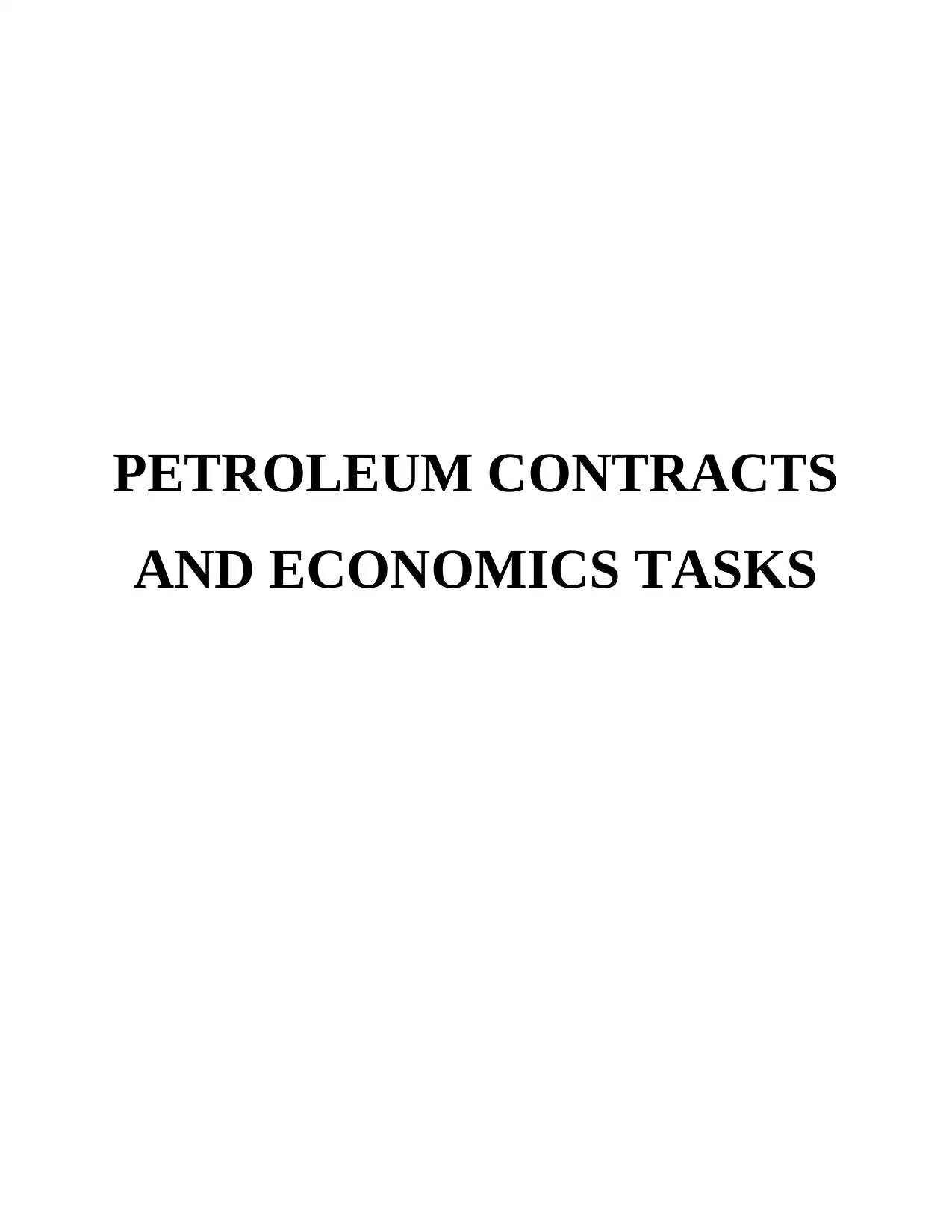
PETROLEUM CONTRACTS
AND ECONOMICS TASKS
AND ECONOMICS TASKS
Paraphrase This Document
Need a fresh take? Get an instant paraphrase of this document with our AI Paraphraser
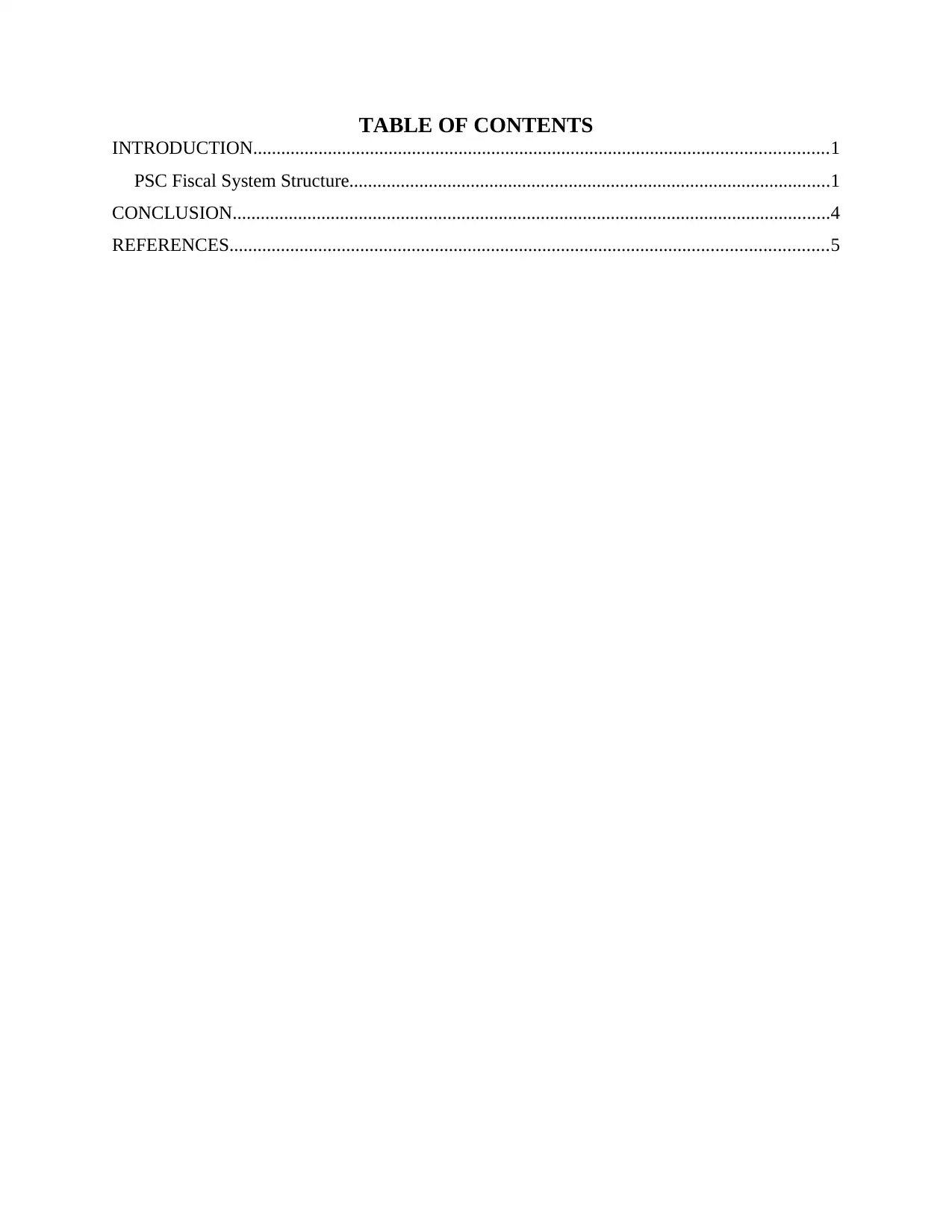
TABLE OF CONTENTS
INTRODUCTION...........................................................................................................................1
PSC Fiscal System Structure.......................................................................................................1
CONCLUSION................................................................................................................................4
REFERENCES................................................................................................................................5
INTRODUCTION...........................................................................................................................1
PSC Fiscal System Structure.......................................................................................................1
CONCLUSION................................................................................................................................4
REFERENCES................................................................................................................................5
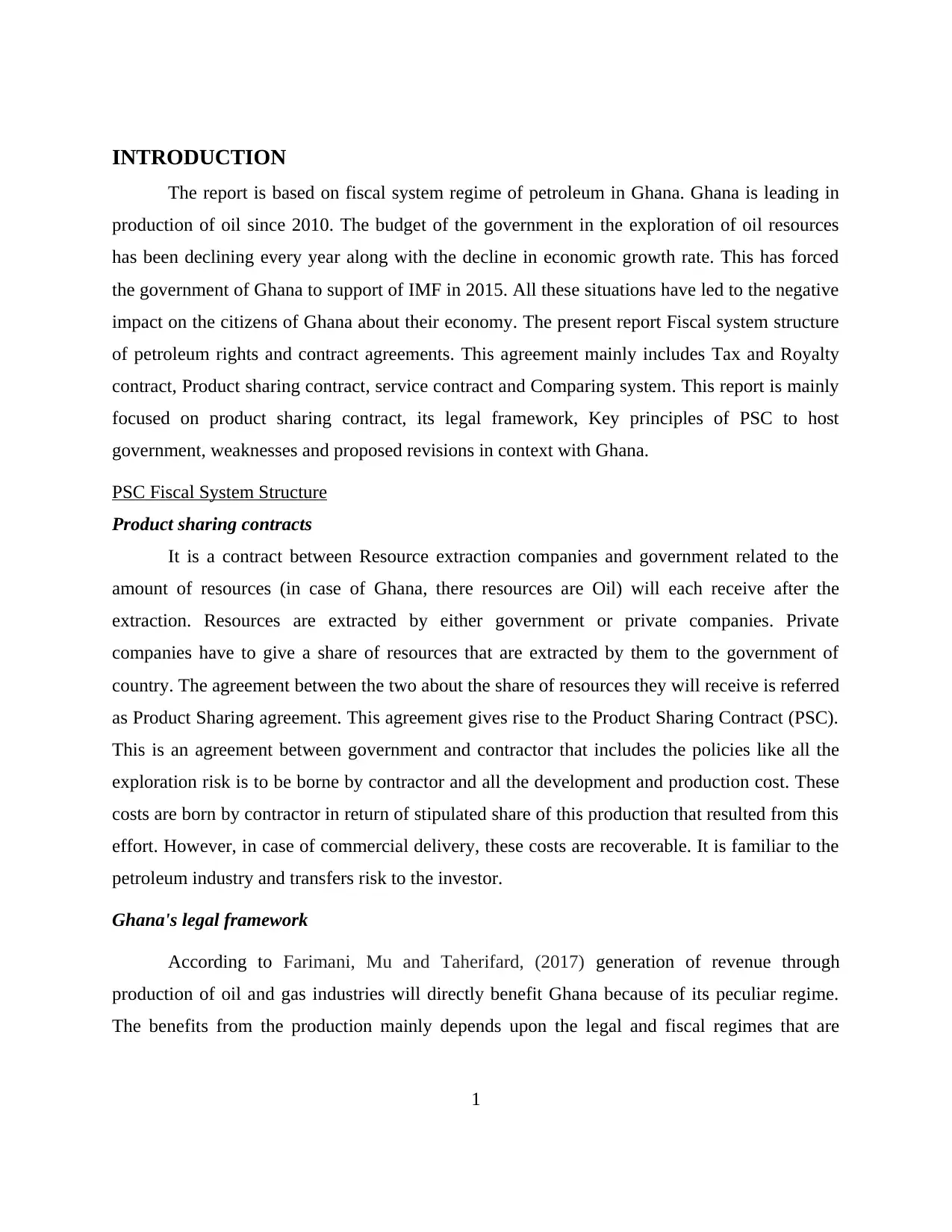
INTRODUCTION
The report is based on fiscal system regime of petroleum in Ghana. Ghana is leading in
production of oil since 2010. The budget of the government in the exploration of oil resources
has been declining every year along with the decline in economic growth rate. This has forced
the government of Ghana to support of IMF in 2015. All these situations have led to the negative
impact on the citizens of Ghana about their economy. The present report Fiscal system structure
of petroleum rights and contract agreements. This agreement mainly includes Tax and Royalty
contract, Product sharing contract, service contract and Comparing system. This report is mainly
focused on product sharing contract, its legal framework, Key principles of PSC to host
government, weaknesses and proposed revisions in context with Ghana.
PSC Fiscal System Structure
Product sharing contracts
It is a contract between Resource extraction companies and government related to the
amount of resources (in case of Ghana, there resources are Oil) will each receive after the
extraction. Resources are extracted by either government or private companies. Private
companies have to give a share of resources that are extracted by them to the government of
country. The agreement between the two about the share of resources they will receive is referred
as Product Sharing agreement. This agreement gives rise to the Product Sharing Contract (PSC).
This is an agreement between government and contractor that includes the policies like all the
exploration risk is to be borne by contractor and all the development and production cost. These
costs are born by contractor in return of stipulated share of this production that resulted from this
effort. However, in case of commercial delivery, these costs are recoverable. It is familiar to the
petroleum industry and transfers risk to the investor.
Ghana's legal framework
According to Farimani, Mu and Taherifard, (2017) generation of revenue through
production of oil and gas industries will directly benefit Ghana because of its peculiar regime.
The benefits from the production mainly depends upon the legal and fiscal regimes that are
1
The report is based on fiscal system regime of petroleum in Ghana. Ghana is leading in
production of oil since 2010. The budget of the government in the exploration of oil resources
has been declining every year along with the decline in economic growth rate. This has forced
the government of Ghana to support of IMF in 2015. All these situations have led to the negative
impact on the citizens of Ghana about their economy. The present report Fiscal system structure
of petroleum rights and contract agreements. This agreement mainly includes Tax and Royalty
contract, Product sharing contract, service contract and Comparing system. This report is mainly
focused on product sharing contract, its legal framework, Key principles of PSC to host
government, weaknesses and proposed revisions in context with Ghana.
PSC Fiscal System Structure
Product sharing contracts
It is a contract between Resource extraction companies and government related to the
amount of resources (in case of Ghana, there resources are Oil) will each receive after the
extraction. Resources are extracted by either government or private companies. Private
companies have to give a share of resources that are extracted by them to the government of
country. The agreement between the two about the share of resources they will receive is referred
as Product Sharing agreement. This agreement gives rise to the Product Sharing Contract (PSC).
This is an agreement between government and contractor that includes the policies like all the
exploration risk is to be borne by contractor and all the development and production cost. These
costs are born by contractor in return of stipulated share of this production that resulted from this
effort. However, in case of commercial delivery, these costs are recoverable. It is familiar to the
petroleum industry and transfers risk to the investor.
Ghana's legal framework
According to Farimani, Mu and Taherifard, (2017) generation of revenue through
production of oil and gas industries will directly benefit Ghana because of its peculiar regime.
The benefits from the production mainly depends upon the legal and fiscal regimes that are
1
⊘ This is a preview!⊘
Do you want full access?
Subscribe today to unlock all pages.

Trusted by 1+ million students worldwide
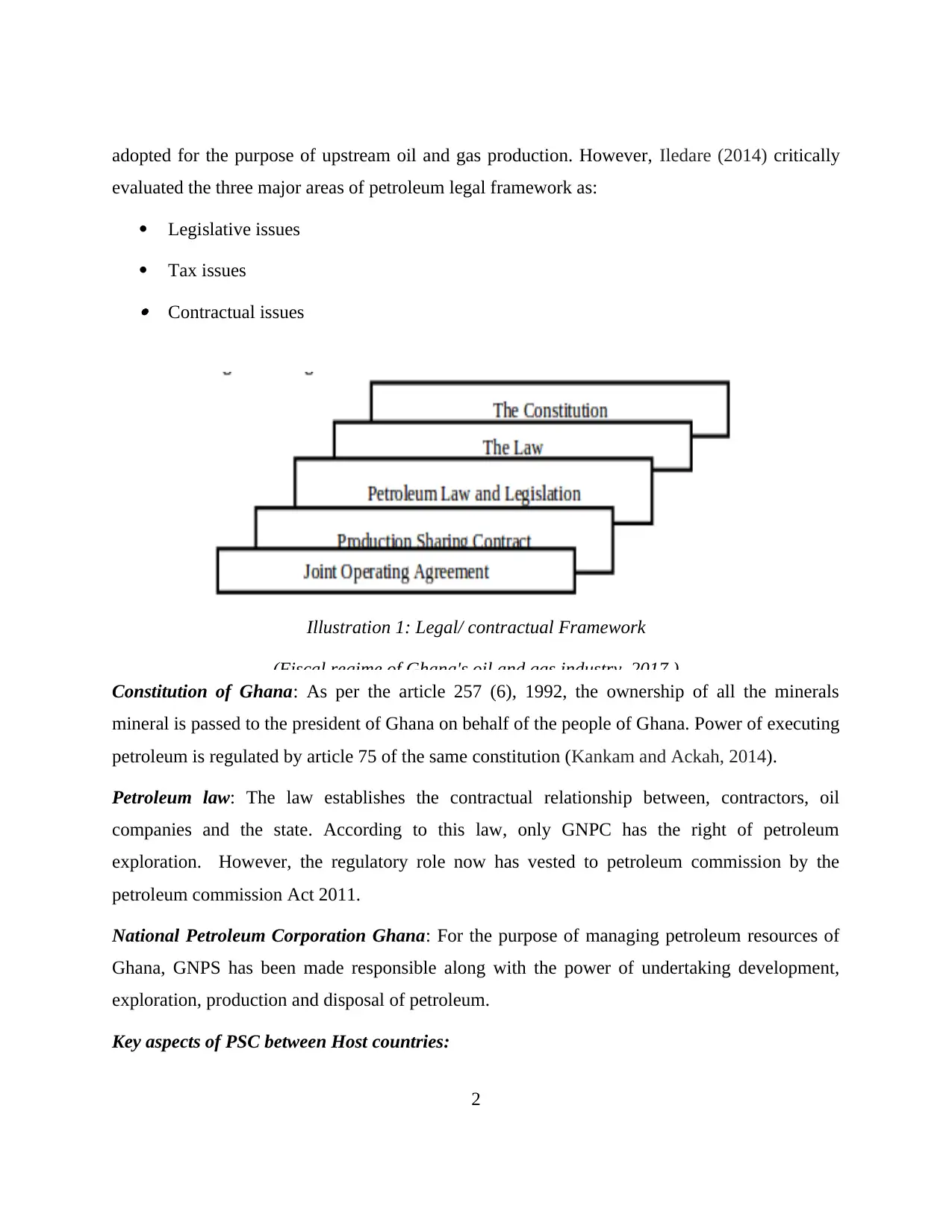
adopted for the purpose of upstream oil and gas production. However, Iledare (2014) critically
evaluated the three major areas of petroleum legal framework as:
Legislative issues
Tax issues Contractual issues
Constitution of Ghana: As per the article 257 (6), 1992, the ownership of all the minerals
mineral is passed to the president of Ghana on behalf of the people of Ghana. Power of executing
petroleum is regulated by article 75 of the same constitution (Kankam and Ackah, 2014).
Petroleum law: The law establishes the contractual relationship between, contractors, oil
companies and the state. According to this law, only GNPC has the right of petroleum
exploration. However, the regulatory role now has vested to petroleum commission by the
petroleum commission Act 2011.
National Petroleum Corporation Ghana: For the purpose of managing petroleum resources of
Ghana, GNPS has been made responsible along with the power of undertaking development,
exploration, production and disposal of petroleum.
Key aspects of PSC between Host countries:
2
Illustration 1: Legal/ contractual Framework
(Fiscal regime of Ghana's oil and gas industry, 2017.)
evaluated the three major areas of petroleum legal framework as:
Legislative issues
Tax issues Contractual issues
Constitution of Ghana: As per the article 257 (6), 1992, the ownership of all the minerals
mineral is passed to the president of Ghana on behalf of the people of Ghana. Power of executing
petroleum is regulated by article 75 of the same constitution (Kankam and Ackah, 2014).
Petroleum law: The law establishes the contractual relationship between, contractors, oil
companies and the state. According to this law, only GNPC has the right of petroleum
exploration. However, the regulatory role now has vested to petroleum commission by the
petroleum commission Act 2011.
National Petroleum Corporation Ghana: For the purpose of managing petroleum resources of
Ghana, GNPS has been made responsible along with the power of undertaking development,
exploration, production and disposal of petroleum.
Key aspects of PSC between Host countries:
2
Illustration 1: Legal/ contractual Framework
(Fiscal regime of Ghana's oil and gas industry, 2017.)
Paraphrase This Document
Need a fresh take? Get an instant paraphrase of this document with our AI Paraphraser
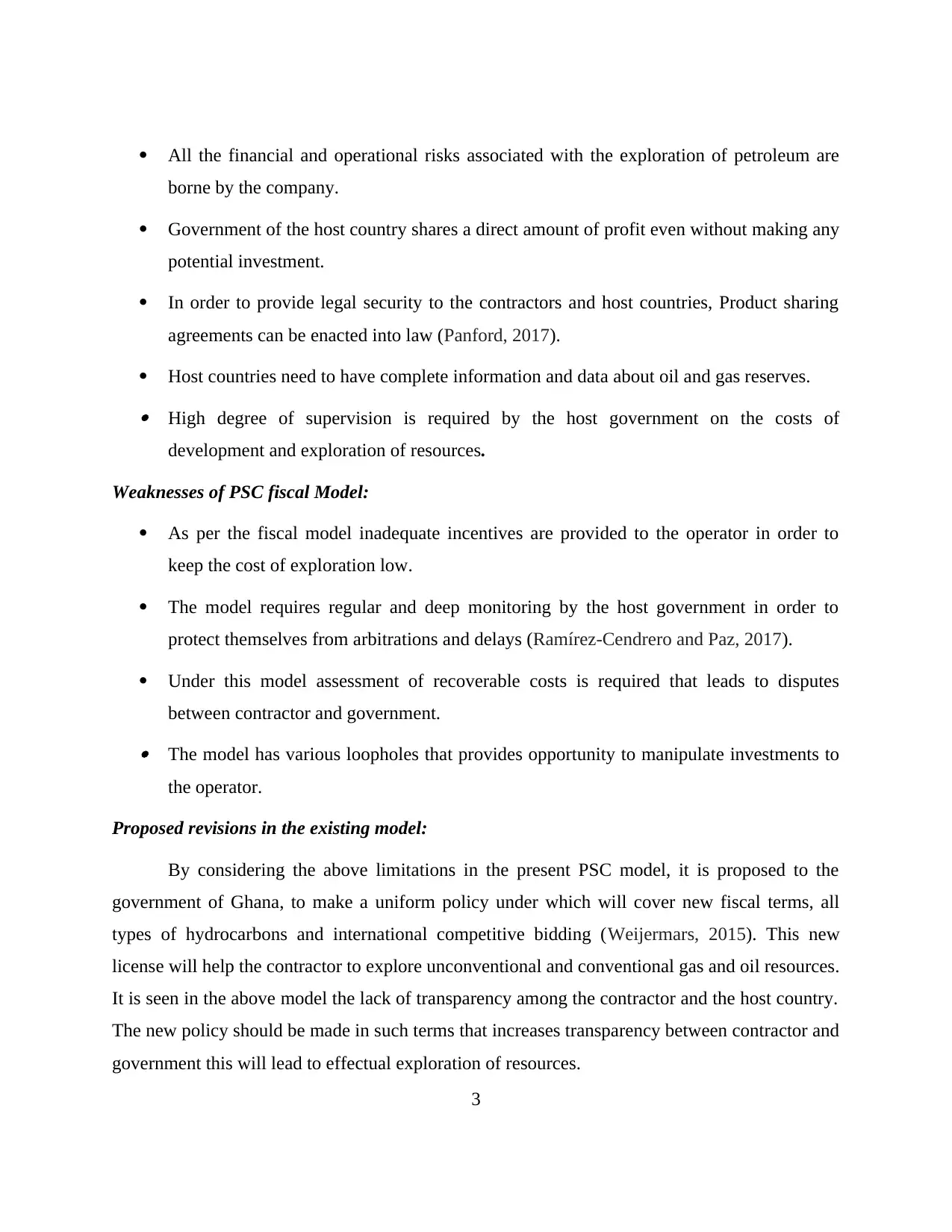
All the financial and operational risks associated with the exploration of petroleum are
borne by the company.
Government of the host country shares a direct amount of profit even without making any
potential investment.
In order to provide legal security to the contractors and host countries, Product sharing
agreements can be enacted into law (Panford, 2017).
Host countries need to have complete information and data about oil and gas reserves. High degree of supervision is required by the host government on the costs of
development and exploration of resources.
Weaknesses of PSC fiscal Model:
As per the fiscal model inadequate incentives are provided to the operator in order to
keep the cost of exploration low.
The model requires regular and deep monitoring by the host government in order to
protect themselves from arbitrations and delays (Ramírez-Cendrero and Paz, 2017).
Under this model assessment of recoverable costs is required that leads to disputes
between contractor and government. The model has various loopholes that provides opportunity to manipulate investments to
the operator.
Proposed revisions in the existing model:
By considering the above limitations in the present PSC model, it is proposed to the
government of Ghana, to make a uniform policy under which will cover new fiscal terms, all
types of hydrocarbons and international competitive bidding (Weijermars, 2015). This new
license will help the contractor to explore unconventional and conventional gas and oil resources.
It is seen in the above model the lack of transparency among the contractor and the host country.
The new policy should be made in such terms that increases transparency between contractor and
government this will lead to effectual exploration of resources.
3
borne by the company.
Government of the host country shares a direct amount of profit even without making any
potential investment.
In order to provide legal security to the contractors and host countries, Product sharing
agreements can be enacted into law (Panford, 2017).
Host countries need to have complete information and data about oil and gas reserves. High degree of supervision is required by the host government on the costs of
development and exploration of resources.
Weaknesses of PSC fiscal Model:
As per the fiscal model inadequate incentives are provided to the operator in order to
keep the cost of exploration low.
The model requires regular and deep monitoring by the host government in order to
protect themselves from arbitrations and delays (Ramírez-Cendrero and Paz, 2017).
Under this model assessment of recoverable costs is required that leads to disputes
between contractor and government. The model has various loopholes that provides opportunity to manipulate investments to
the operator.
Proposed revisions in the existing model:
By considering the above limitations in the present PSC model, it is proposed to the
government of Ghana, to make a uniform policy under which will cover new fiscal terms, all
types of hydrocarbons and international competitive bidding (Weijermars, 2015). This new
license will help the contractor to explore unconventional and conventional gas and oil resources.
It is seen in the above model the lack of transparency among the contractor and the host country.
The new policy should be made in such terms that increases transparency between contractor and
government this will lead to effectual exploration of resources.
3
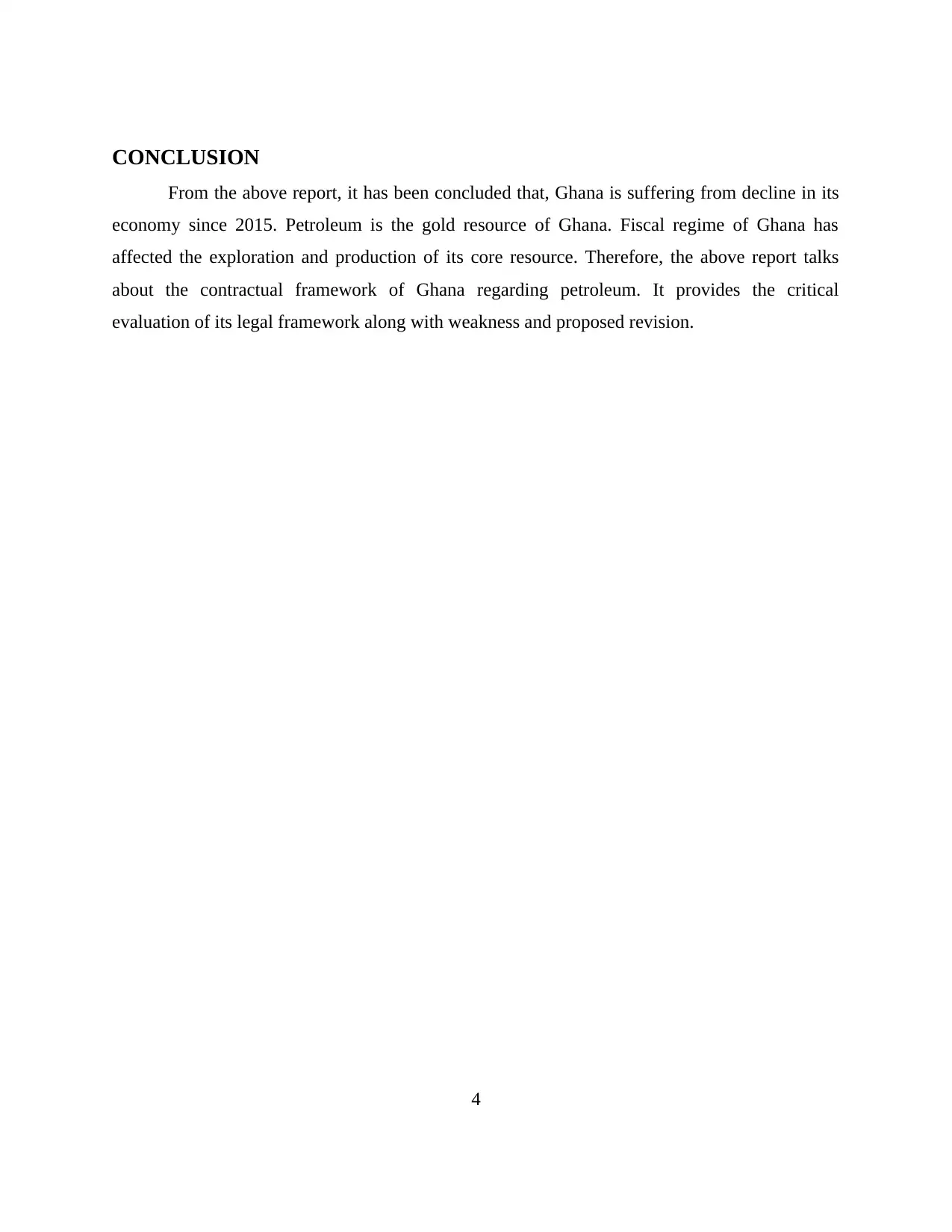
CONCLUSION
From the above report, it has been concluded that, Ghana is suffering from decline in its
economy since 2015. Petroleum is the gold resource of Ghana. Fiscal regime of Ghana has
affected the exploration and production of its core resource. Therefore, the above report talks
about the contractual framework of Ghana regarding petroleum. It provides the critical
evaluation of its legal framework along with weakness and proposed revision.
4
From the above report, it has been concluded that, Ghana is suffering from decline in its
economy since 2015. Petroleum is the gold resource of Ghana. Fiscal regime of Ghana has
affected the exploration and production of its core resource. Therefore, the above report talks
about the contractual framework of Ghana regarding petroleum. It provides the critical
evaluation of its legal framework along with weakness and proposed revision.
4
⊘ This is a preview!⊘
Do you want full access?
Subscribe today to unlock all pages.

Trusted by 1+ million students worldwide
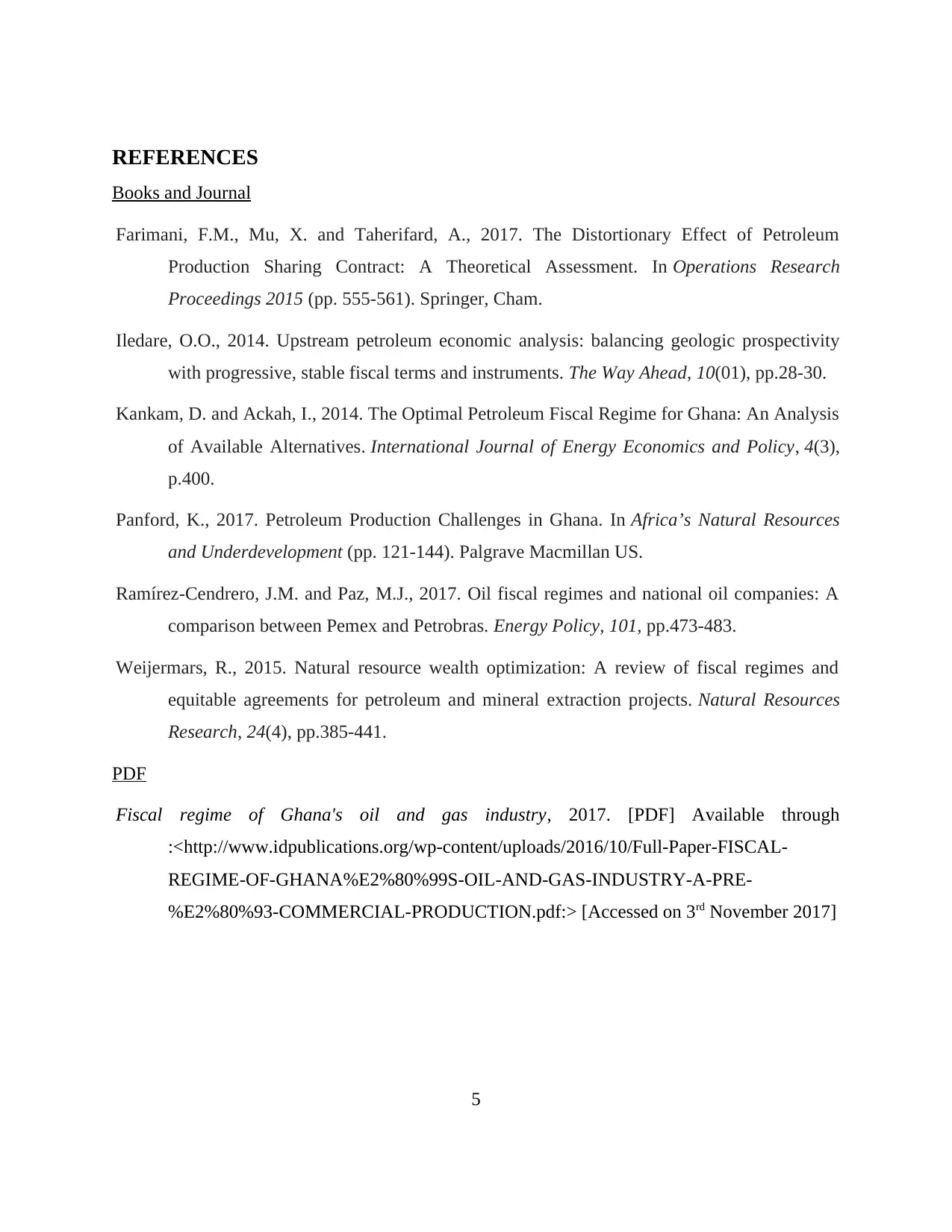
REFERENCES
Books and Journal
Farimani, F.M., Mu, X. and Taherifard, A., 2017. The Distortionary Effect of Petroleum
Production Sharing Contract: A Theoretical Assessment. In Operations Research
Proceedings 2015 (pp. 555-561). Springer, Cham.
Iledare, O.O., 2014. Upstream petroleum economic analysis: balancing geologic prospectivity
with progressive, stable fiscal terms and instruments. The Way Ahead, 10(01), pp.28-30.
Kankam, D. and Ackah, I., 2014. The Optimal Petroleum Fiscal Regime for Ghana: An Analysis
of Available Alternatives. International Journal of Energy Economics and Policy, 4(3),
p.400.
Panford, K., 2017. Petroleum Production Challenges in Ghana. In Africa’s Natural Resources
and Underdevelopment (pp. 121-144). Palgrave Macmillan US.
Ramírez-Cendrero, J.M. and Paz, M.J., 2017. Oil fiscal regimes and national oil companies: A
comparison between Pemex and Petrobras. Energy Policy, 101, pp.473-483.
Weijermars, R., 2015. Natural resource wealth optimization: A review of fiscal regimes and
equitable agreements for petroleum and mineral extraction projects. Natural Resources
Research, 24(4), pp.385-441.
PDF
Fiscal regime of Ghana's oil and gas industry, 2017. [PDF] Available through
:<http://www.idpublications.org/wp-content/uploads/2016/10/Full-Paper-FISCAL-
REGIME-OF-GHANA%E2%80%99S-OIL-AND-GAS-INDUSTRY-A-PRE-
%E2%80%93-COMMERCIAL-PRODUCTION.pdf:> [Accessed on 3rd November 2017]
5
Books and Journal
Farimani, F.M., Mu, X. and Taherifard, A., 2017. The Distortionary Effect of Petroleum
Production Sharing Contract: A Theoretical Assessment. In Operations Research
Proceedings 2015 (pp. 555-561). Springer, Cham.
Iledare, O.O., 2014. Upstream petroleum economic analysis: balancing geologic prospectivity
with progressive, stable fiscal terms and instruments. The Way Ahead, 10(01), pp.28-30.
Kankam, D. and Ackah, I., 2014. The Optimal Petroleum Fiscal Regime for Ghana: An Analysis
of Available Alternatives. International Journal of Energy Economics and Policy, 4(3),
p.400.
Panford, K., 2017. Petroleum Production Challenges in Ghana. In Africa’s Natural Resources
and Underdevelopment (pp. 121-144). Palgrave Macmillan US.
Ramírez-Cendrero, J.M. and Paz, M.J., 2017. Oil fiscal regimes and national oil companies: A
comparison between Pemex and Petrobras. Energy Policy, 101, pp.473-483.
Weijermars, R., 2015. Natural resource wealth optimization: A review of fiscal regimes and
equitable agreements for petroleum and mineral extraction projects. Natural Resources
Research, 24(4), pp.385-441.
Fiscal regime of Ghana's oil and gas industry, 2017. [PDF] Available through
:<http://www.idpublications.org/wp-content/uploads/2016/10/Full-Paper-FISCAL-
REGIME-OF-GHANA%E2%80%99S-OIL-AND-GAS-INDUSTRY-A-PRE-
%E2%80%93-COMMERCIAL-PRODUCTION.pdf:> [Accessed on 3rd November 2017]
5
1 out of 7
Related Documents
Your All-in-One AI-Powered Toolkit for Academic Success.
+13062052269
info@desklib.com
Available 24*7 on WhatsApp / Email
![[object Object]](/_next/static/media/star-bottom.7253800d.svg)
Unlock your academic potential
Copyright © 2020–2026 A2Z Services. All Rights Reserved. Developed and managed by ZUCOL.





